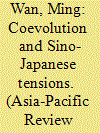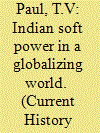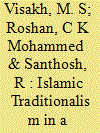|
|
|
Sort Order |
|
|
|
Items / Page
|
|
|
|
|
|
|
| Srl | Item |
| 1 |
ID:
131846


|
|
|
|
|
| Publication |
2014.
|
| Summary/Abstract |
Unlike those who blame the other side or structural forces beyond one's control for the current Sino-Japanese tensions, this paper offers a theoretical insight about the coevolution between China and Japan to explain why the two Asian great powers that had a better relationship in the past are now experiencing greater tensions when their much closer economic and people-to-people ties should facilitate greater cooperation. The two nations have coevolved over millennia with increasing intensity over time. They avoided serious tensions in the 1970s-1990s partly thanks to each being situated in a different niche. But that separation has diminished in a globalizing world and the two countries are becoming more integrated, which has triggered a backlash. The earlier generation of proponents of Sino-Japanese friendship succeeded in forging strong economic and social ties, but the current generation finds it difficult politically and psychologically to manage the new reality in their relations.
|
|
|
|
|
|
|
|
|
|
|
|
|
|
|
|
| 2 |
ID:
129653


|
|
|
|
|
| Publication |
2014.
|
| Summary/Abstract |
Soft power-based on intangible indicators such as culture, civilization, literature, philosophy, involvement in global institutions, diplomacy, political organization, and state capacity-has emerged as an important factor in the globalizing world for nations seeking higher status and influence. But an appraisal of India's present and putative soft power assets underscores the need for greater hard power resources in order to harness soft power more effectively. Indeed, soft power without hard power is a chimera, and they should not be seen in oppositional terms, especially for an aspiring global power. Hard power sources include military, economic, demographic, and technological assets. As defined by Harvard's Joseph S. Nye Jr. in his 2004 book Soft Power: The Means to Success in World Politics, soft power "is the ability to get what you want through attraction rather than coercion or payments. It arises from the attractiveness of a country's culture, political ideals, and policies. When our policies are seen as legitimate in the eyes of others, our soft power is enhanced." Yet a country relying solely on soft power without hard power assets can find its weaknesses exposed easily. This happened to India in 1962, when China inflicted a humiliating military defeat on it, tarnishing New Delhi's hard-won soft power position in the world, especially among other de.
|
|
|
|
|
|
|
|
|
|
|
|
|
|
|
|
| 3 |
ID:
181126


|
|
|
|
|
| Summary/Abstract |
In our ethnography among traditionalist Sunni Muslims of Kerala, South India, we observe the emergence of new intellectual critiques of Islamic reformism and a revival of ‘traditional’ Islamic articulations. A new class of traditionalist Sunni ulama, claiming to be ‘turbaned professionals’, plays an instrumental role in providing epistemic sanctioning to ‘traditional’ Islamic piety while simultaneously grounding it within the discourses and processes of neoliberal developmentalism. Such assertions of traditionalist Sunni Muslim identity challenge the conventional understanding of Islamic reformism as a hallmark of the progressive understanding of faith and traditionalism as its ‘anti-modern’ other. The article argues that this discursive shift of Sunni Islamic traditionalism in Kerala since the 1980s from defensive to more assertive forms has to be located in the context of wider socio-economic change within the community facilitated by structural as well as cultural forces of globalization. We point out that this process traverses the local, national, and global scales of identification, and results in intense negotiations between local identifications and ‘true Islamicate global imaginations’. These negotiations bring in new discourses around the question of ‘authentic’ Islamic practices and sensibilities among the traditionalist Sunni Muslims, forcing us to locate the question of their identity formation beyond the boundaries of communities and the nation states that ensconce them.
|
|
|
|
|
|
|
|
|
|
|
|
|
|
|
|
|
|
|
|
|